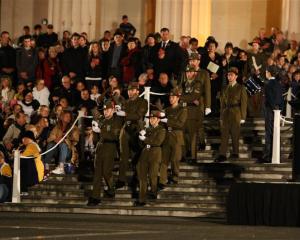A ban on children walking in some Australian Anzac Day marches won't be adopted by New Zealand's Returned and Services' Association (RSA).
In Brisbane, children were banned from walking with their relatives, with Anzac Day Combined Parade Committee chairman John Strachan saying women pushing prams and kids on shoulders was "not about the dignity of the veterans".
He said veterans were entitled to have a carer with them but "one carer turns into four kids".
Organisers of Adelaide's commemoration also warn high numbers of next of kin are intruding on veterans and diminishing the occasion.
South Australia Anzac Day committee chairman Bill Denny accused relatives of "barging in" on the march, crowding veterans, confusing the viewing public and "essentially preventing our grand old men and women (from) receiving the acknowledgement they are due".
New Zealand RSA chief executive Stephen Clarke said New Zealand's parades were generally smaller and shorter than Australia's, meaning a ban on children or other relatives was not needed.
"In Australia the parade of veterans has historically been a central part of the Anzac Day observance with very large numbers. The New Zealand observance concentrates more on the wreathlaying service where families and children participate by laying a poppy at the war memorial," Mr Clarke said.
"It is great to see so many young faces at Anzac Day services and they provide much comfort to veterans to know that the memory of their fallen comrades will not be forgotten."
Meanwhile, Australian war veterans were being banned from riding on army Land Rovers in Anzac Day marches due to the risk of injury and legal action under Australia's occupational health and safety legislation.
Some of Western Australia's oldest and frailest soldiers, mostly from World War 2, survived combat but were waging a losing battle with bureaucrats ahead of Sunday's Anzac Day commemorations.
A Returned and Services League (RSL) sub-branch at Scarborough in Western Australia had been refused access to vehicles from their local army base because of concerns the veterans might suffer injuries getting in and out of the transport.
"The commander believed army vehicles were not the most appropriate for veterans and elderly to step in and out of," an RSL spokesman told the Herald Sun newspaper.
Under an amended Occupational Health and Safety Act, the army and the Commonwealth would be liable should any injuries occur.
Opposition defence spokesman David Johnston said using safety rules to avoid providing vehicles was inexcusable.
"What do they expect our elderly veterans to do? Are they meant to walk the whole way? Catch a bus?" he said.
RSL national president Ken Doolan lamented the decision and hoped taxis or local volunteer drivers would step into the breach.
In Sydney, the New South Wales RSL has told unit associations to provide stepladders or other means so veterans can safely get in and out of open vehicles.
There will be 39 army Land Rovers ferrying veterans - including a small New Zealand contingent - through central Sydney.





